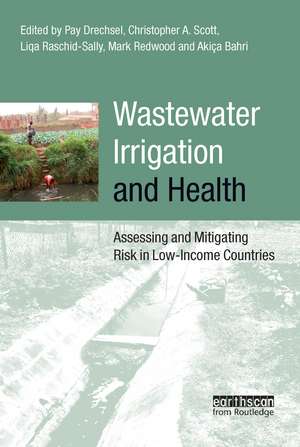Wastewater Irrigation and Health: Assessing and Mitigating Risk in Low-income Countries
Editat de Akissa Bahri, Pay Drechsel, Liqa Raschid-Sally, Mark Redwooden Limba Engleză Paperback – 16 dec 2009
Preț: 220.21 lei
Preț vechi: 260.82 lei
-16% Nou
Puncte Express: 330
Preț estimativ în valută:
42.14€ • 43.75$ • 35.14£
42.14€ • 43.75$ • 35.14£
Comandă specială
Livrare economică 01-15 martie
Doresc să fiu notificat când acest titlu va fi disponibil:
Se trimite...
Preluare comenzi: 021 569.72.76
Specificații
ISBN-13: 9781844077960
ISBN-10: 1844077969
Pagini: 432
Dimensiuni: 156 x 234 x 33 mm
Greutate: 0.66 kg
Ediția:New.
Editura: Taylor & Francis
Colecția Routledge
Locul publicării:Oxford, United Kingdom
ISBN-10: 1844077969
Pagini: 432
Dimensiuni: 156 x 234 x 33 mm
Greutate: 0.66 kg
Ediția:New.
Editura: Taylor & Francis
Colecția Routledge
Locul publicării:Oxford, United Kingdom
Cuprins
Preface ForewordList of Acronyms and AbbreviationsPart I: Setting the Stage1: Wastewater, Sludge and Excreta Use in Developing Countries: An Overview2: Assessing and Mitigating Wastewater Related Health Risks in Low-Income Countries: An IntroductionPart II: Risks and Risk Assessment 3: Risk Analysis and Epidemiology: The 2006 WHO Guidelines for the Safe Use of Wastewater in Agriculture4: Approaches to Evaluate and Develop Health Risk-Based Standards Using Available Data 5: Tools for Risk Analysis: Updating the 2006 WHO Guidelines6: Non-Pathogenic Tradeoffs of Wastewater Irrigation 7: Risk Analysis Integrating Livelihood and Economic Impacts of Wastewater Irrigation on Health Part III: Minimizing Health Risks8: Wastewater Treatment for Pathogen Removal and Nutrient Conservation: Suitable Systems for Use in Developing Countries9: Low-Cost Options for Pathogen Reduction and Nutrient Recovery from Faecal Sludge10: Farm-Based Measures for Reducing Microbiological Health Risks for Consumers from Informal Wastewater-Irrigated Agriculture 11: Farm-Based Measures for Reducing Human and Environmental Health Risks from Chemical Constituents in Wastewater12: Applying the Multiple-Barrier Approach for Microbial Risk Reduction in the Post-Harvest Sector of Wastewater Irrigated Vegetables13: Cost Effectiveness Analysis of Interventions for Diarrhoea Disease Reduction among Consumers of Wastewater-Irrigated Lettuce in GhanaPart IV: Wastewater Governance and Adoption of Risk Reduction Options14: Challenging Conventional Approaches to Wastewater Use in Agriculture15: Designing Reuse-Oriented Sanitation Infrastructure: The Design for Service Planning Approach16: Facilitating the Adoption of Food Safety Interventions in the Street Food Sector and on Farm 17: Harnessing Farmers' Knowledge and Perceptions for Health Risk Reduction in Wastewater Irrigated Agriculture 18: Multi-Stakeholder Processes for Managing Wastewater Use in Agriculture Part V: Conclusions and Outlook19: Wastewater Irrigation and Health: Challenges and Outlook for Mitigating Risks in Low-Income Countries
Notă biografică
Pay Drechsel is Global Theme Leader on 'Water Quality, Health & Environment' at the International Water Management Institute (IWMI), Sri Lanka. Christopher A. Scott is a professor of public policy and geography at the University of Arizona, USA. Liqa Raschid-Sally is Senior Wastewater Irrigation Expert at IWMI, Ghana. Mark Redwood is the Urban Poverty and Environment Program Leader at the International Development Research Centre (IDRC), Canada. Aki a Bahri is Director for Africa at IWMI, Ghana and international expert on wastewater and sludge use in irrigated agriculture.
Recenzii
This book represents the best, modern innovative thinking on the topic and symbolizes an important turning point in the history of wastewater reuse in irrigation as a major contributor to water and nutrient conservation, public health and welfare.' Professor Hillel Shuval, Hadassah Academic College and Hebrew University, Jerusalem, Israel'This is a tremendously useful book with its clear focus on developing countries where wastewater treatment does not work. It is also a great resource for students.' Sasha Koo-Oshima, FAOThis book is likely to be of interest to decision makers, consultants and researchers who are looking for practical tools to improve the selection of wastewater management strategies particularly in countries of the global south, and where water scarcity is critical. The lively and informative style makes it an accessible and easy read...definitely a worthwhile investment.'Barbara Evans, Waterlines'The volume is successful in moving the state of knowledge beyond these basic perceptions and documenting methods for safe wastewater irrigation.'International Journal of Water Resources Development'This book provides great insights into appropriate solution development for anyone interested in closed loop or cradle-to-cradle design and presents an approach for how to apply these concepts to a complex and culturally sensitive topic.'Ecosystem Marketplace
